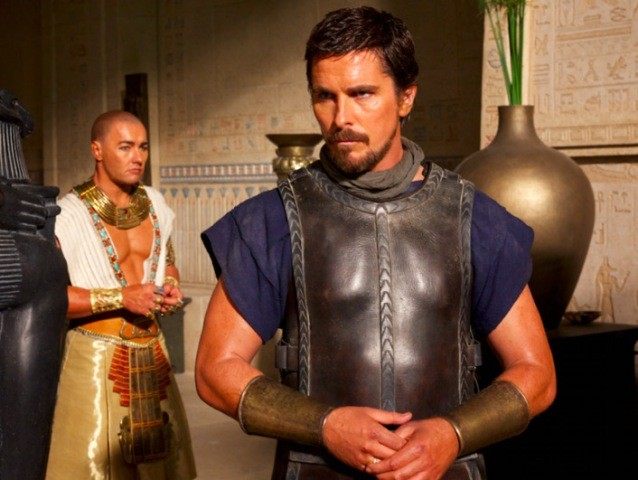When it comes to director Ridley Scott’s artistic and storytelling choices, there’s so much wrong with “Exodus: Gods and Kings,” it’s hard to care about the director’s childish hostility towards religion, which no doubt resulted in a bloodless, brutally boring tale of Moses the Lawgiver.
Honestly, if it weren’t for the fact that film reviewing is my job, I would’ve left long before the parting of the Red Sea.
Spiritually and artistically, Scott seems determined to be the anti-DeMille, which might give small-minded atheists something to giggle about, but it kills the movie for anyone else — believer or not — simply looking to lose themselves in a big CGI’d epic for 142 minutes.

Except for the above-mentioned Red Sea parting, Scott foolishly focuses on aspects of the Moses story DeMille didn’t, and vice versa. The result is a butt-numbing tediousness as we watch the just-exiled Moses (Christian Bale) wander forever in the desert. This does nothing to move the story or build the central character. DeMille understood this and got right to a goat-herding, romance sequence.
Worse still is The Chase through the desert just before the parting of the Red Sea. Everyone over five knows Moses and his 400,000 newly-freed followers will escape Ramses’ (Joel Edgerton) bloodlust and his legions of chariots. Regardless, where DeMille wisely cut to the confrontation and water-spectacle, Scott delivers an interminable chase sequence that works so hard at failing to deliver tension, it plays like a spoof of a bad chase sequence.
Despite four screenwriters, including Oscar-winner Steve Zallian, the story structure is by far the film’s biggest problem. The first act is actually pretty good. Scott skips over the basket-in-the-Nile stuff and jumps directly to a grown Moses, the adopted and favored son of Pharaoh – the warrior and brother to the mercurial Ramses. That’s all good. Once Moses is told who he is, though, the plot loses all its flow. From here on the story is episodic, and the episodes just aren’t interesting.
This is obviously not the screenwriters’ fault. The fact that big stars like Ben Kingsley and Sigourney Weaver are wasted, and a number of subplots end up discarded without a resolution, telegraphs a torturous post-production process.
The secular elite love to point and laugh at the run-time and a few campy pieces of dialogue (“Moses, Moses, Moses!”) in DeMille’s 1956 masterpiece. Laugh away. Although a full hundred minutes longer than Scott’s debacle, DeMille’s brilliant plot structure grabs hold of you and never lets go. The dialogue is also brilliant, whereas I can’t remember a single notable line from what I saw just 12 hours ago.
Thematically, Scott makes a fool of himself. DeMille used the ancient biblical tale to tell a universal story about human liberty. Where Charlton Heston’s Moses demanded that Ramses “Let my people go!”, Bale’s Moses — and this is no joke — demands that Ramses pay his slaves a living wage and make them — again, no joke — citizens. DeMille’s Moses was a liberator. Scott’s Moses is a community organizer agitating for executive action on the minimum wage and amnesty.

Scott is a top-flight director who has his pick of projects. Regardless, “Exodus” plays like it was helmed by a resentful man forced to take it on against his will. Just as we saw with director Darren Aronofsky’s “Noah,” “Exodus” goes out of its way to avoid expressing or making us feel the majesty and wonder of God.
Instead, Scott reduces God to an angry, petulant child (literally) who wants to wish everyone who displeases him into the cornfield. Aronofsky’s anti-God sentiments at least made for a legitimately impressive (although sinister) piece of art. Scott’s bitter atheism only resulted in a laughable choice that would offend you if you weren’t so busy thinking, “What the hell?”
To be fair, the faith aspects do come together with the parting of the Red Sea straight through to the conclusion, which has some poetry. But I promise you, it’s not worth the slog.
Worldwide, Mel Gibson’s “Passion of the Christ” made $612 million dollars. And that was a brutally violent (necessarily), mid-budgeted R-rated film with no big stars. “Noah,” a PG-13 tentpole with a big star topped out worldwide at $362 million. If everything goes right this weekend, “Exodus” is expected to clear $30 million, compared to “Noah’s” $43 million. Nonetheless, “Noah” barely eked out $100 million domestically, whereas “The Passion” reached $370 million.
These bigoted, provincial, secular, left-wing Hollywood morons hand projects like “Noah” and “Exodus” to filmmakers determined to strip history’s most moving and inspiring stories of everything that moves and inspires. “The Passion” printed money because it hit the faithful squarely where we lived.
“Noah” and “Exodus” just lie there like a Muzak version of “Sexual Healing.”
Follow John Nolte on Twitter @NolteNC

COMMENTS
Please let us know if you're having issues with commenting.